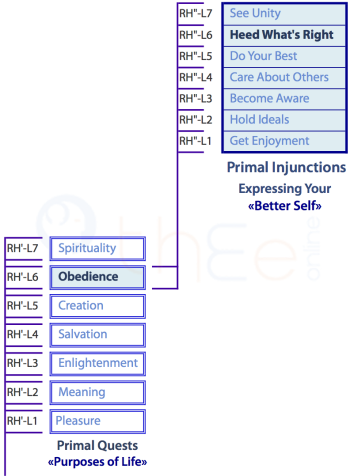Heed What's Right: RH"L6
Quest → Injunction

The Obedience Quest is based on choosing an institution that is suitable and then adhering to the duties, prescriptions or procedures/rituals of that institution. One of the quest's essential features lies in the subordination of personal preferences. «» sums up this . This naturally applies to the military or a monastery, where is intrinsic. But not everyone can be expected to have the mindset of a soldier or a monk.
The might focus on , but this social-ethical demand conveys something that seems too explicit (and even too easy) to be suitable.![]() More
More
With as our frame of reference, we must cast our net more widely: to include situations which are inchoate, complicated, chaotic, or disordered. Now where does lie? In general, it lies with «». But freed of social demands, why should you take notice or worry about your obligations? Such cases reveal two aspects of : knowing duty and heeding what we know.
So the proposed is to «». That means perceiving and taking notice of your duty according to your own lights in times of uncertainty, in the face of temptation and when under social pressure to herd or be a lemming.![]() More
More
This highlights and validates a person's which is built on the significance in living of a version of right or rightness.
Potential Misconceptions
- This heeding is a personal insight, not an impersonal knowledge of abstractions, or memorization of a catechism. Nor is it something based on scientific analysis, as applies in making a .
- It is not necessarily obvious to others what your duty is—though it may be. No two people inhabit the same psychosocial world. So for you may not be identical to for another, even in what is superficially the same situation.
- There have been many harmful laws in all societies, and consequences deemed good may be evils in disguise. So does not depend on social support or approval, nor on identified consequences. This means that neither a deontological nor a teleological perspective is dominant.
- There is no doing in this . Because the law abstracts and generalizes, your duty in the moment might lead you to accept being arrested. Because custom is often crude, your duty might lead you to being publicly vilified. However, it cannot be pre-specified whether or how arrest or vilification should influence your choice.
Why Is It So Hard?
can be difficult from a purely practical perspective because everyone has so many endeavours, groups and roles in society, and each of these has so many attached obligations. So, in practice, there are continually conflicts between obligations. Conflict only disappears if you ignore your responsibilities and do not actively ensure that you are aware of your obligations.
Your groups are particularly problematic because they seek their own survival and well-being. So members rarely appreciate conflicts between your implicit personal obligations and the group's drives.
In many situations, especially when there is social disorder, is extremely difficult and even harder. So surrender to herd emotions is exceedingly attractive.
Egotism is built around motivations like interest, desire and need. These stand in stark opposition to obligation and so make difficult. relates to something beyond yourself.
- Next : see unity.
Originally posted:16-Nov-2012